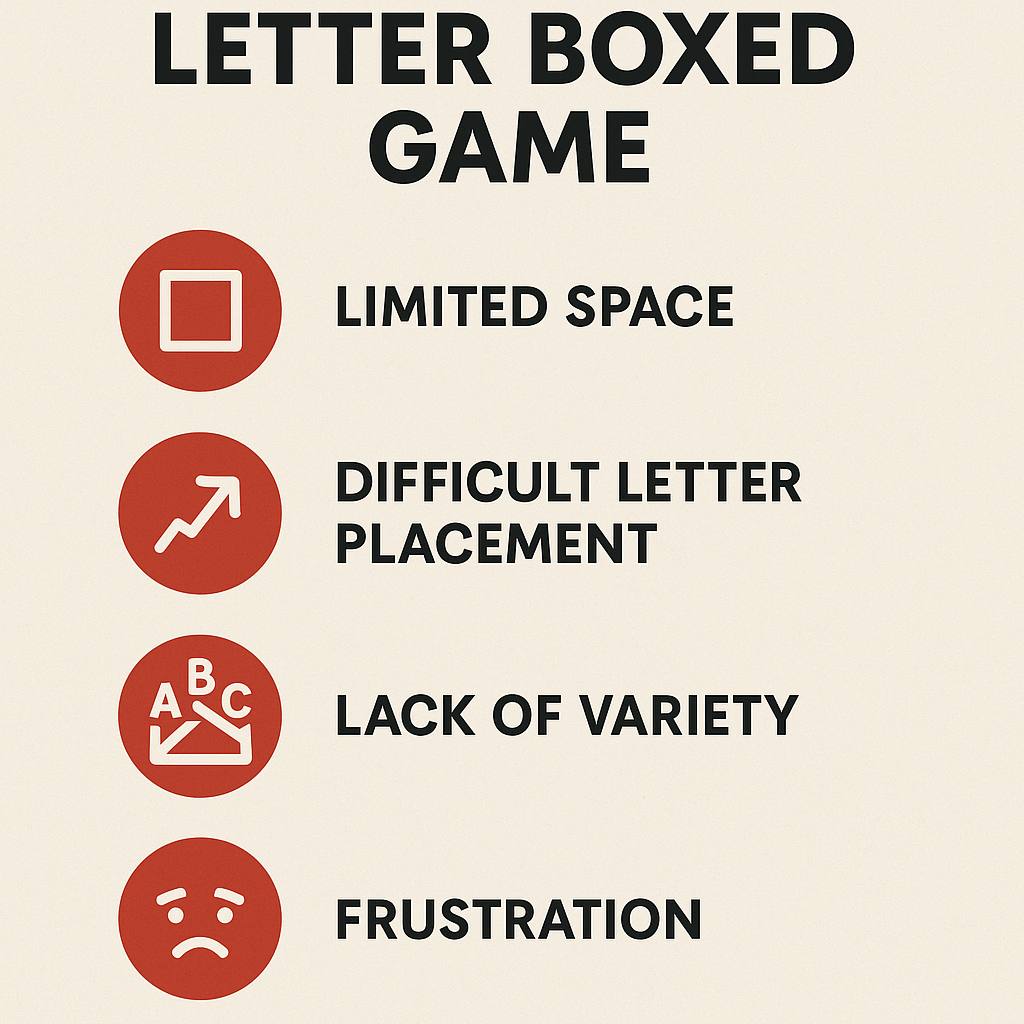Understanding the Drawbacks of Letter Boxed Games: What You Need to Know
Introduction to Letter Boxed Games
Letter boxed games have surged in popularity, captivating puzzle enthusiasts and casual gamers alike. However, while they offer unique gameplay experiences, they also come with several drawbacks that can hinder enjoyment and engagement. In this article, we will explore the limitations of letter boxed games, providing a comprehensive overview of their potential downsides.
What Are Letter Boxed Games?
Before delving into the drawbacks, it’s essential to understand what letter boxed games are. These games usually involve a grid or a box filled with letters, where players must create words by connecting adjacent letters.
Key Features of Letter Boxed Games
- Interactive word formation
- Timed challenges or turn-based play
- Variety of puzzles and difficulty levels
Drawbacks of Letter Boxed Games
While letter boxed games can be fun and intellectually stimulating, there are several drawbacks that players should consider:
1. Limited Gameplay Variability
One of the most significant drawbacks of letter boxed games is their limited gameplay variability. Players may quickly exhaust the challenges and find themselves repeating similar patterns.
- Repetitive gameplay can lead to boredom.
- Fewer surprises or new elements introduced in puzzles.
2. Accessibility Issues
Accessibility is another critical concern. Many letter boxed games are designed with a specific target audience in mind, often neglecting those with disabilities.
- Visual impairments may struggle with letter visibility.
- Limited options for auditory feedback can alienate hearing-impaired players.
3. Steep Learning Curve
While some players enjoy a challenge, the steep learning curve associated with letter boxed games can deter newcomers. Understanding the rules and strategies often requires time and practice.
- New players may feel overwhelmed by complex game mechanics.
- Experienced players can dominate, making it hard for beginners to participate.
4. Potential for Frustration
As with many puzzle games, letter boxed games can lead to frustration, particularly when players struggle to achieve goals or complete levels.
- High levels of difficulty can discourage casual gamers.
- Players may feel disheartened by repeated failures.
5. Dependency on Vocabulary
Letter boxed games often rely heavily on vocabulary skills, which can alienate players who may not have a strong command of the language.
- Players with limited vocabulary may struggle to compete.
- Language barriers can impact enjoyment for non-native speakers.
6. Time Constraints
Many letter boxed games come with time limits, adding pressure that can detract from the overall enjoyment of the game.
- Time constraints may lead to rushed decisions, resulting in poor gameplay.
- Players may find it difficult to relax and enjoy the game.
7. Lack of Social Interaction
While some letter boxed games offer multiplayer options, many are single-player experiences, which can limit social interaction and community building.
- Players may miss out on the camaraderie found in multiplayer games.
- Limited opportunities for cooperative play can reduce enjoyment.
Conclusion
In conclusion, while letter boxed games offer unique and engaging puzzles for word lovers, they are not without their drawbacks. Limited gameplay variability, accessibility issues, and a high potential for frustration can impact player enjoyment. Understanding these challenges can help players make informed decisions on whether to dive into the world of letter boxed games. Remember, every game has its pros and cons, and it’s essential to weigh them according to your preferences!
Frequently Asked Questions (FAQs)
1. What are some popular letter boxed games?
Some popular letter boxed games include Wordle, Scrabble, and Boggle.
2. Are letter boxed games suitable for all ages?
While many letter boxed games are designed for various age groups, some may have vocabulary or complexity that’s more suited to adults.
3. How can I improve my skills in letter boxed games?
To improve, practice regularly, expand your vocabulary, and consider playing with others to learn new strategies.
4. Can letter boxed games be played online?
Yes, many letter boxed games have online versions or apps that allow players to compete against others globally.
5. What should I look for in a good letter boxed game?
Look for games that provide a balance of challenge and accessibility, with varied gameplay and community engagement options.
6. Are there any letter boxed games designed for players with disabilities?
Some games focus on inclusivity, offering features such as adjustable difficulty, audio prompts, or visual aids to assist players with disabilities.
7. How do letter boxed games compare to other puzzle genres?
Letter boxed games often focus on word formation and vocabulary, while other puzzle genres may emphasize logic, strategy, or visual skills.

Leave a Reply